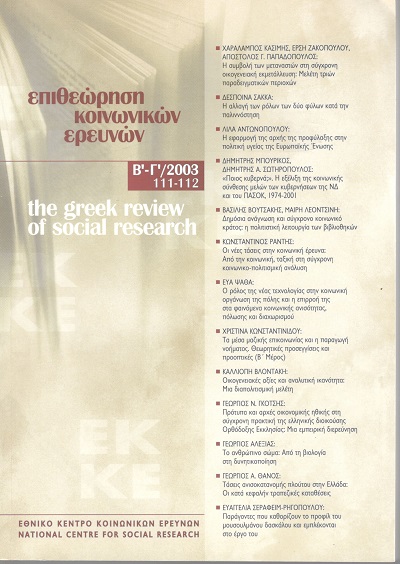Οικογενειακές αξίες και αναλυτική ικανότητα: Μια διαπολιτισμική μελέτη
Abstract
Η έρευνα αυτή πραγματεύεται τη σχέση ανάμεσα στη μορφή της Οικογένειας (εκτεταμένη-πυρηνική), στις αξίες της (συλλογικές-ατομιστικές) και στην αναλυτική ικανότητα των εφήβων, όπως αυτή εκφράζεται ως «εστιασμένος» (field independent, FI) ή «διάχυτος» (field dependent, FD) γνωστικός τύπος, σε συνάρτηση με το οικολογικό πλαίσιο (αγροτικό-αστικό). Το δείγμα αποτελείται από 569 εφήβους ηλικίας 15-17 ετών από την Ελλάδα και τη Βρετανία, δύο χώρες οι οποίες διαφέρουν ως προς την πολιτισμική διάσταση συλλογικότητα-ατομισμός. Τα ευρήματα της έρευνας επισημαίνουν ότι οι υποστηρικτικές σχέσεις, όπως εκφράζονται ως εγγύτητα κατοικίας και συχνότητα συναντήσεων, σε συνδυασμό με σύγχρονες οικογενειακές αξίες, μάλλον ευνοούν την ενθάρρυνση της πρωτοβουλίας και της ανεξαρτησίας των παιδιών, η οποία σύμφωνα με το θεωρητικό πλαίσιο συντελεί στην ανάπτυξη μεγαλύτερης αναλυτικής ικανότητας.
Article Details
- How to Cite
-
Βλοντάκη Κ. (2003). Οικογενειακές αξίες και αναλυτική ικανότητα: Μια διαπολιτισμική μελέτη. The Greek Review of Social Research, 111, 267–289. https://doi.org/10.12681/grsr.9227
- Issue
- 2003: 111-112 Β'-Γ'
- Section
- Articles

This work is licensed under a Creative Commons Attribution-NonCommercial 4.0 International License.
Authors who publish with this journal agree to the following terms:
- Authors retain copyright and grant the journal right of first publication with the work simultaneously licensed under a Creative Commons Attribution Non-Commercial License that allows others to share the work with an acknowledgement of the work's authorship and initial publication in this journal.
- Authors are able to enter into separate, additional contractual arrangements for the non-exclusive distribution of the journal's published version of the work (e.g. post it to an institutional repository or publish it in a book), with an acknowledgement of its initial publication in this journal.
- Authors are permitted and encouraged to post their work online (preferably in institutional repositories or on their website) prior to and during the submission process, as it can lead to productive exchanges, as well as earlier and greater citation of published work (See The Effect of Open Access).



